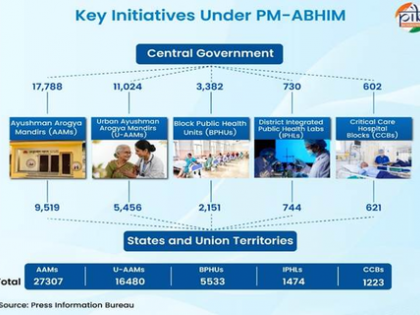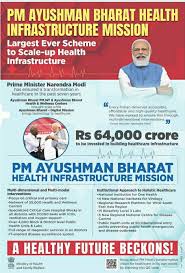PM- Ayushman Bharat Health Infrastructure Mission (PM-ABHIM)

- 29 Oct 2025
In News:
The Pradhan Mantri–Ayushman Bharat Health Infrastructure Mission (PM-ABHIM), launched in October 2021, represents one of India’s most ambitious national health-system strengthening initiatives. Conceived in the aftermath of COVID-19, the Mission aims to build a resilient, modern, and self-reliant public health infrastructure capable of responding effectively to future pandemics and health emergencies.
Mission Structure and Financial Outlay
- PM-ABHIM is implemented as a Centrally Sponsored Scheme (CSS) with select Central Sector components, with a total allocation of ?64,180 crore for the period 2021-22 to 2025-26.
- This multi-layered programme focuses on fortifying health infrastructure from the village level to the district level, while simultaneously creating a national network for disease surveillance and laboratory capacity.
Key Components of PM-ABHIM
1. Primary and Secondary Healthcare Strengthening
The Mission envisions comprehensive infrastructure development through:
- Ayushman Arogya Mandirs (AAMs) replacing and upgrading Sub-Centres and Primary Health Centres.
- Urban Health and Wellness Centres established in slum and underserved urban areas.
- Block Public Health Units (BPHUs) to enhance diagnostic, surveillance, and public health management capacity at the block level.
These interventions aim to fill service delivery gaps and ensure equitable access to quality healthcare, especially in rural and vulnerable regions.
2. District-Level Critical Health Infrastructure
- Establishment of Critical Care Hospital Blocks (CCHBs) in every district to provide advanced and emergency care.
- Creation and upgradation of Integrated District Public Health Labs (IDPHLs) for comprehensive testing and epidemiological support.
These facilities are intended to strengthen district-level readiness for public health emergencies and mass-casualty situations.
3. Strengthened Disease Surveillance and Pandemic Preparedness
A significant feature of PM-ABHIM is the creation of an IT-enabled, real-time disease surveillance system. This network links:
- Block-level labs
- District surveillance units
- Regional surveillance centres
- National institutions
The government has highlighted that PM-ABHIM has substantially enhanced India’s health surveillance capabilities, enabling faster detection, notification, and response during outbreaks. The integration of digital tools allows seamless data sharing and analytics—essential for early warning and rapid containment strategies.
4. Research, Innovation, and One Health Approach
The Mission supports:
- Advanced research on COVID-19, emerging infectious diseases, and health emergencies.
- Laboratories and platforms promoting scientific innovation.
- Adoption of the One Health approach, recognising the linkages between human, animal, and environmental health to prevent zoonotic diseases.
Policy Significance
PM-ABHIM marks a paradigm shift from reactive health crisis management to proactive preparedness. Its multi-tiered infrastructure plan, focus on training, surveillance networks, and integration of modern technologies positions India to handle:
- Emerging infectious diseases
- Climate-linked health threats
- Biosecurity risks
- Mass public health emergencies
The Mission also contributes to the broader goals of Ayushman Bharat, Universal Health Coverage (UHC), and Sustainable Development Goals (SDGs), by bridging regional disparities and strengthening healthcare accessibility.
PM- Ayushman Bharat Health Infrastructure Mission (PM-ABHIM) Scheme

- 29 Dec 2024
In News:
- The Delhi High Court has ordered the signing of a Memorandum of Understanding (MoU) between the Union Ministry of Health and Family Welfare and the Delhi Government.
- This MoU will facilitate the implementation of the PM-Ayushman Bharat Health Infrastructure Mission (PM-ABHIM) in Delhi.
About PM-Ayushman Bharat Health Infrastructure Mission (PM-ABHIM):
- Scheme Type: Centrally Sponsored Scheme (CSS) with some Central Sector Components (CS).
- Total Outlay: Rs. 64,180 Crores for the period 2021-22 to 2025-26.
- Objective:
- To strengthen healthcare infrastructure across India, focusing on:
- Building capacities in health systems at primary, secondary, and tertiary levels.
- Preparing health systems to effectively respond to current and future pandemics/disasters.
- Key Focus Areas:
- Filling critical gaps in health infrastructure, surveillance, and health research in both urban and rural areas.
- Improving healthcare delivery across the entire continuum of care.
- Central Sector Components (CS) under the Scheme:
- 12 Central Institutions: To act as training and mentoring sites with 150-bedded Critical Care Hospital Blocks (CCBs).
- Strengthening NCDC: Boosting the National Centre for Disease Control (NCDC) and establishing 5 new regional NCDCs.
- Health Surveillance: Creation of 20 metropolitan health surveillance units and expansion of Integrated Health Information Portal across all States/UTs.
- Public Health Units: Operationalization of 17 new Public Health Units and strengthening 33 existing units at Points of Entry (Airports, Seaports, Land Crossings).
- Emergency Health Infrastructure: Establishment of 15 Health Emergency Operation Centres and 2 mobile hospitals.
- Research and Virology Institutes: Setting up a national institution for One Health, 4 new National Institutes for Virology, and 9 Biosafety Level III laboratories.
- Support for States/UTs under CSS Component:
- Health and Wellness Centres (HWCs):
- 17,788 rural HWCs: To be built in areas with populations of 5000 (plain) or 3000 (difficult terrain like hills, tribals, desert).
- 11,024 urban HWCs: Focus on slum and vulnerable areas with a population of 15,000-20,000.
- Block Public Health Units (BPHUs): Establishment of 3,382 BPHUs at the block level to strengthen healthcare accessibility.
- Integrated Public Health Labs (IPHLs): Setting up 730 IPHLs across districts for better health monitoring.
- Critical Care Hospital Blocks (CCBs): Establishment of 602 CCBs in districts with populations exceeding 5 lakh and referral linkages in other districts.
- Overall Goal: PM-ABHIM aims to significantly enhance healthcare infrastructure in India, making healthcare more accessible and effective, especially in rural and underdeveloped areas.
